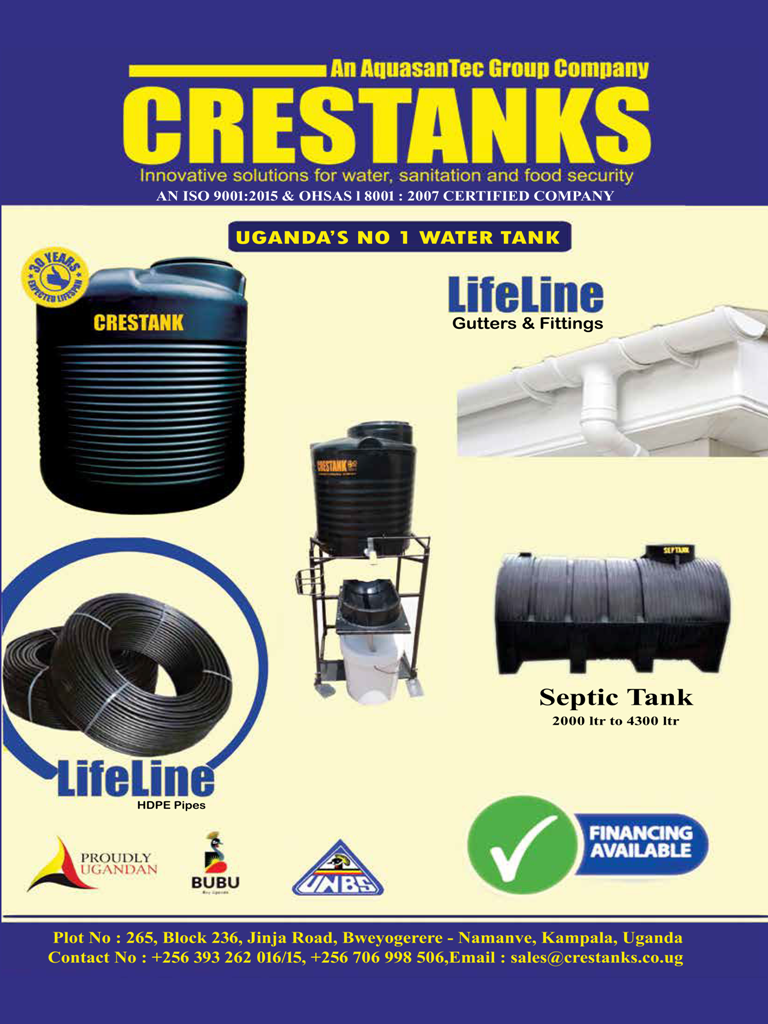With the growing number of population in Gulu City, water and sanitation hygiene is steadily picking up though a lot still needs to be done.
Apparently, National Water and Sewerage Corporation (NWSC) is only serving 11,037 households, representing 60% of the coverage.
Equally, only about 65% of Gulu City’s households have toilet facilities while handwashing currently stands at 80% from 5% in March.
Ivan Tekakwo, the NWSC Public relations officer for Northern Uganda, said by June, only about 8,000 customers had access to clean water.
However, Tekakwo attributes the increase in the accessibility to rolling out of Service Coverage Acceleration Programme (SCAP) targeting 100% of water coverage.
“This programme is intended to cater for the new sub-wards that were recently added to Gulu City and the target is to have two water points in each,” he added.
Concern at hand
However, there is an increasing number of households whose toilet sewage lines have been connected to Oitino stream that feeds into Oitino dam.
In the last year’s assessment carried out in February from Kasubi Goans subward, Kasubi parish Bardege division by Gulu municipality authorities and NWSC, over 20 homes were found to have their toilets connected to the stream which flows up to Oitino dam.
When this journalist carried out an on-spot check, indeed it was very visible that toilets had been constructed just less than five meters away and faecal pipes were pouring waste into the stream.
Relatedly, it is also evident that all households along the stream do not have garbage pits and the only alternative around is depositing all what they accumulate into the water.
“When our leaders and technocrats came here last year, demolition of all these toilets was supposed to commence immediately, but to date there is no progress,” Patrick Onen, a resident, added.
“As NWSC, we cannot take on the policing role of the city. We are doing our part of continuing to sensitize the community on the dangers that come with such an action,” Tekakwo said.
He added that when the issue was brought to the attention of the municipal authority last year before it had been elevated to a city, the leaders said they lacked funding to execute the demolition exercise.
Garbage management plan
In the last financial year, the municipal council, with funding from Fichtner Water and Transportation developed a waste management plan of first coming out with a bylaw.
Peter Okwera, the former Gulu Municipal speaker, said before the municipal had been dissolved, the bylaw had already been presented before the council and forwarded to a committee of social services for scrutiny.
The bylaw intends to address issues of waste segregation, recycling, management and transportation, community engagement and fines and penalties.
So far, through Fichtner, the council has already acquired five acres of land in Laroo-Pece division where waste shall be sorted and fermented into manure. The project is expected to cost shs3.5b.
On a daily basis, 4.5 tonnes of waste is generated in Gulu City and it is expected that this shall not be enough for the manure production.
“We have a plan to start buying waste from other districts so that the processing plant can have enough once it’s operational,” Okwera who is going to be part of the interim leadership noted.
“However, in the whole of this process, we are also encouraging Private Public Partnership where the investors can take the responsibility of collecting the waste and turn it into manure as a business,” he added.
Other waste management initiatives
Before the creation of Gulu City, the then Bardege division council had passed a resolution where households were supposed to pay sh500 every quarter to facilitate garbage collection.
Patrick Yoorac who was the speaker said the resolution was targeting households along Oitino stream that feeds into Oitino dam, the source of water supplied by NWSC in Gulu City.
With about 800 households in Kasubi Goans quarters and Kasubi central sub-wards, Yoorac said the money would be used to fuel the trucks.
To ensure compliance, the division had given the mandate of collecting the fees to the sub-ward local council chairpersons through a bylaw.
Santa Amarowt, 43, said it was a pity seeing local residents throw garbage into the stream but also faecal matter, a practice that has escalated of recent.
“If the municipal authorities can’t avail us with garbage skips, then we need a dumping site because this situation is very dangerous to us though we’ve not hard severe health related problem in the area,” she added.
What leaders have in plan
Daniel Soca Ocan who is vying for the LC5 councillor’s position in Laroo-Pece division, observed that water is much lacking, especially in the dry season when taps sometimes run dry for three days.
Ocan adds that this is the same situation when it comes to the sewage lines that keep on bursting and making the town stink. Being a lower councillor at the division level, Ocan wants to build close collaboration with the NWSC so that such challenges are addressed.
Patrick Okello who is contesting as the mayor for Layibi-Bardege division wants to ensure that funds are allocated to procure garbage trucks for effective collection.
Okello notes that all the parishes that were curved out of Omoro and Gulu districts to become part of the City must have dumping sites so that it is easy to manage.
Nancy Atimango who is contesting for Member of Parliament for Laroo-Pece division said water is very critical in running industries but also for home consumption.
Atimango notes that there are a couple of slums within the City that are facing lack of clean water supply and they only rely on spring wells.
As a former employee of NWSC, she is optimistic that the water supply project being tapped from Karuma will ensure clean, safe and stable supply to the consumers.
“I’m personally working on the protection of open spring wells in some sub-wards to ensure clean water supply, notwithstanding tree planning for environmental conservation,” she added.
Alfred Okwonga, the Mayoral City contestant under the NRM party, wants to promote public-private partnerships to fill up the gap left by the city authorities.
Okwonga adds that with a lot of waste being generated in the City, it is very expensive to collect the waste. However, if it is to be collected and recycled, the proceeds can be re-ploughed.
While Karuma project will address limited access to water, there is need to encourage the community on embrace rainwater harvesting to supplement tap water. It is cheaper and clean.
“Waste collection at the moment is not being done well. You find it is heaped in one place for more than one week, which is not good. I would want to see waste being collected on a daily basis and only being done at night like in the other cities around the world. This is because I want to avoid inconveniencing city dwellers when they are doing their businesses,” he added.

















